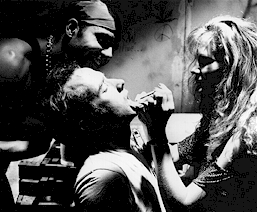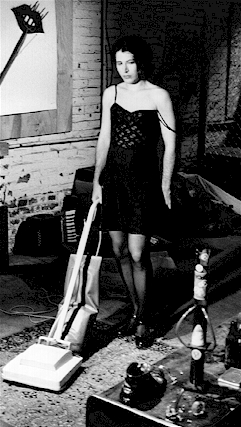| Surrender Dorothy by James Berardinelli
Surrender Dorothy betrays its low budget through its 16 mm black-and-white print. Rather than detracting from the experience, however, the grainy, almost primitive-looking cinematography enhances the film’s effectiveness, lending an almost-documentary quality to the proceedings that offsets the twisted fairy tale quality of the narrative. The movie’s look is perfect for the story; color or even a crisper black-and-white would not have been as effective. The core relationship between Trevor and Lanh is obviously homosexual, but Surrender Dorothy isn’t a "gay film." The fact is, Trevor wants a woman, and is able to delude himself into believing that Lanh (who he calls "Dorothy") is (or can become) one. The real focus of DiNovis’ picture is on Trevor’s obsession. It’s frightening to consider the kind of monster that can lurk within the psyche of someone as apparently-ineffectual as Trevor. (Of course, neighbors of mass murderers, when interviewed, inevitably remark, "He seemed to be such a nice, quiet person.") Surrender Dorothy can also be seen as an autopsy of a universal problem: domestic abuse. Trevor is the abuser and Lanh is the victim, and, although their roles are nontraditional, the patterns are familiar. The abuse is psychological, not physical, with Lanh trapped in this dysfunctional cycle, unable to break free. The defeated, broken Lanh we see late in the film is a far different individual from the cocky man who first moves into Trevor’s apartment. Likewise, Trevor has been transformed from a frightened mouse into a cruel monster.
Surrender Dorothy is part dark comedy and part (David) Lynch-inspired melodrama, although it doesn’t fit neatly into either category. It’s an assault on political correctness and middle class values, but the underlying message is too urgent to disregard. Ultimately, Surrender Dorothy isn’t easy to like (in much the same way that something in the nature of Blue Velvet isn’t easy to like), but it is undeniably powerful. A week after I saw Surrender Dorothy, it still lingers in my consciousness while movies viewed in the interim have already faded.
|
 The fact that Kevin
DiNovis’ debut feature, Surrender Dorothy, won the Grand Jury Prize at the 1998
Slamdance Film Festival should be a warning signal to anyone expecting something even
remotely mainstream. Surrender Dorothy is startling, gripping, disturbing, and out on the
film making edge. It’s the kind of movie that we don’t see enough of because its
commercial prospects are so limited. This kind of picture is unlikely to appeal to typical
movie-goers (or, for that matter, even to a significant portion of the art house crowd),
and, as a result, directors stay away from this sort of in-your-face excursion into
psychological deviance and obsession.
The fact that Kevin
DiNovis’ debut feature, Surrender Dorothy, won the Grand Jury Prize at the 1998
Slamdance Film Festival should be a warning signal to anyone expecting something even
remotely mainstream. Surrender Dorothy is startling, gripping, disturbing, and out on the
film making edge. It’s the kind of movie that we don’t see enough of because its
commercial prospects are so limited. This kind of picture is unlikely to appeal to typical
movie-goers (or, for that matter, even to a significant portion of the art house crowd),
and, as a result, directors stay away from this sort of in-your-face excursion into
psychological deviance and obsession. The story follows a twisted,
co-dependent relationship as it spirals into ever-darker territory. The lead character is
Trevor (Peter Pryor), a 27 year-old busboy who lives alone in a Philadelphia apartment.
His only friend is Denis (Jason Centeno), a drug dealer, and his extreme fear of women
prevents him from even going out on a date, let alone having a girlfriend. So Trevor lives
his solitary, stale life, nursing his loneliness until someone comes along to change it.
That person is Lanh (Kevin DiNovis), a 25 year-old heroin addict. Following a drug theft,
Lanh is in hiding from Denis and comes to Trevor for a place to stay. In return for
shelter, Trevor exacts a price—he gradually begins to transform Lanh into his vision
of the "perfect woman." To obtain a daily fix, Lanh must wear women’s
clothing, makeup, and high heels. And, as Trevor’s need to have a "real
woman" grows, his plans for Lanh become progressively more bizarre.
The story follows a twisted,
co-dependent relationship as it spirals into ever-darker territory. The lead character is
Trevor (Peter Pryor), a 27 year-old busboy who lives alone in a Philadelphia apartment.
His only friend is Denis (Jason Centeno), a drug dealer, and his extreme fear of women
prevents him from even going out on a date, let alone having a girlfriend. So Trevor lives
his solitary, stale life, nursing his loneliness until someone comes along to change it.
That person is Lanh (Kevin DiNovis), a 25 year-old heroin addict. Following a drug theft,
Lanh is in hiding from Denis and comes to Trevor for a place to stay. In return for
shelter, Trevor exacts a price—he gradually begins to transform Lanh into his vision
of the "perfect woman." To obtain a daily fix, Lanh must wear women’s
clothing, makeup, and high heels. And, as Trevor’s need to have a "real
woman" grows, his plans for Lanh become progressively more bizarre. The lead actors both give fine performances. Peter
Pryor is completely believable as Trevor, the kind of meek person we see every day on the
street and in shops, but rarely notice. Even more impressive is Kevin DiNovis, who shows
great courage by placing himself in such a controversial role. Apparently, DiNovis
wasn’t his own first choice for Lanh, but, when the actor originally cast in the part
backed out at the last minute, DiNovis had no choice if he wanted to make the film. The
results are a testament to the sometimes-fortunate twists of fate on an independent movie
shoot. DiNovis is the perfect Lanh/Dorothy.
The lead actors both give fine performances. Peter
Pryor is completely believable as Trevor, the kind of meek person we see every day on the
street and in shops, but rarely notice. Even more impressive is Kevin DiNovis, who shows
great courage by placing himself in such a controversial role. Apparently, DiNovis
wasn’t his own first choice for Lanh, but, when the actor originally cast in the part
backed out at the last minute, DiNovis had no choice if he wanted to make the film. The
results are a testament to the sometimes-fortunate twists of fate on an independent movie
shoot. DiNovis is the perfect Lanh/Dorothy.